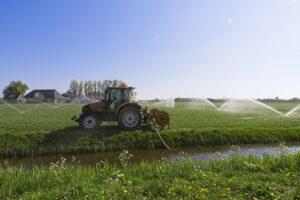State Secretary of the Ministry of Agriculture: Water retention is the key to drought protection
Water retention may be the key to drought protection, and long-term solutions may require investments lasting for years – said the State Secretary of the Ministry of Agriculture (AM) responsible for agriculture in the M1 current affairs channel’s Monday morning program.

(Photo: Pixabay)
Imre Hubai announced that the government supports the filling of dried-up lake beds, backwaters, water reservoir facilities, and canals in order to retain water. For a long time, harmful excess water caused problems, which is why flood and inland water drainage was the main task, but climate change put an end to this period. Costly investments may be needed especially in the Southern Great Plain, where irrigation farming could be ensured by sustainable water management facilities. The planning of these has begun, and public procurement tenders may also be published soon. The State Secretary highlighted the area in need of irrigation as the Sand Dunes, where production opportunities have decreased due to changes in ecological conditions, but modern irrigation could reverse this process. 95 percent of domestic water, he added, comes from neighboring countries, so the rules for access to water must be clarified together and water management must be coordinated with them.
Water retention is primarily the responsibility of state facilities, but producers and local communities must also be interested in helping with their own resources
Water-saving soil cultivation can be the solution against the drying effect of the wind, and attention must also be paid to the organic matter content that ensures water retention capacity, because soil burnout and excessive use of fertilizers make surface interventions ineffective. The Secretary of State noted that almost 1 million hectares of land made cultivable by river regulation still struggle with water shortages, their specific properties do not allow for efficient crop production. These soils need to change in order to become resilient, as they can be best utilized if they are used in a way that matches their properties, emphasized Imre Hubai.
MTI
Related news
State compensation for the victims of Bászna Gabona Zrt. has been completed
🎧 Hallgasd a cikket: Lejátszás Szünet Folytatás Leállítás Nyelv: Auto…
Read more >In 2025, FruitVeB considered the support and professional coordination of the TÉSZs as its priority task
🎧 Hallgasd a cikket: Lejátszás Szünet Folytatás Leállítás Nyelv: Auto…
Read more >Related news
József Viski: Adaptation and competitiveness are key for the horticultural sector
🎧 Hallgasd a cikket: Lejátszás Szünet Folytatás Leállítás Nyelv: Auto…
Read more >Festival buzz at the 60th anniversary EuroShop trade fair
🎧 Hallgasd a cikket: Lejátszás Szünet Folytatás Leállítás Nyelv: Auto…
Read more >






